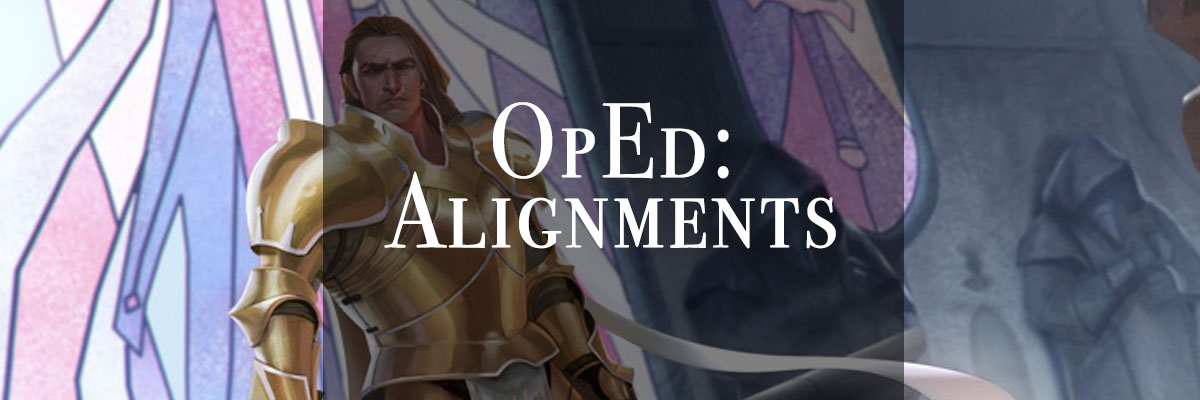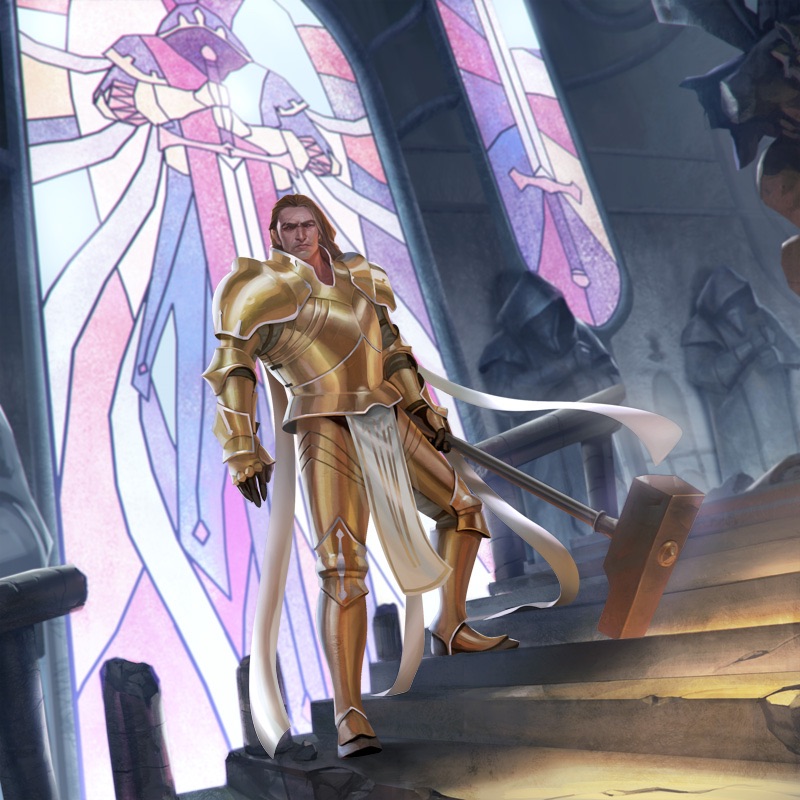Let’s Think About Alignment

It’s a mix.
People are a mix of “good” and “evil”. I think this is different from “supernatural evil”, such as vampires or demons, who have either been afflicted with a curse or are born/created with the desire or irresistible motivation to do “evil”.
Without getting too philosophical about it in this opinion piece, speaking from my own personal understanding the line between good and evil has more to do with actions that ether serve life or seek/attempt to destroy it. Using this definition of good and evil, one can see the problem that arises from using good and evil alignments in a game like D&D. It is a rare thing for humans to be truly evil, unless they are clinically insane, sociopathic, or do not have the mental capacity to understand the results of their actions. Most all human-types of creatures in any fantasy environment reproduce and rear young will probably have an innate, unspoken rule or understanding that life is precious. After all, there is a drive to continue the species.
Alignment can be fluid.
This is why in my games, alignment is fluid. Take a player’s paladin, for example. Traditionally they are Lawful Good. But what happens when the law conflicts with their inner sense of honor? Do they follow the law? If they don’t follow the law, does their alignment begin to slide? What are the consequences for the alignment shift? Do they start losing powers? I handle this in my games by asking my players whose characters are paladins to come up with an unbreakable and personal “moral code” or “code of honor”. And they stick to that, not any external laws. In terms of good and evil in the case of paladins in my game, that is bound up in altruism versus selfishness AND their moral code, and not necessarily good and evil. Unless they just go around killing babies for fun, I usually leave them alone, so long as they are following their code.
I have also used a modified version of Easy Daemus’s Alignment tracking to see when and how a character’s alignment may start to slide. This comes into play with paladins and clerics a lot, and to an extent, druids in my games. The more the slide, the harder it is for them to use their abilities. Slide too much, and they lose them all together! I compare this with the original, starting alignment or honor code that the player has given me.
Part of this philosophy was used while I wrote the Paladins in Gods and Goddesses. Each of the sixteen that I created for that book has their own personal code that they cannot deviate from, else they will lose their abilities. This happens over time, but one thing that I did consider (and didn’t add it to the book, however), was using the fatigue chart in DMG to provide effects when/if a paladin of a certain deity betrayed their own oath. Perhaps for a time, they simply cannot muster the strength to create that flaming sword? Or, they lose their healing capacities for a time? You’ll also notice that I did include alignments in the builds. That is there for DMs who wish to use this mechanic in their games.

Stoic Templar – Legends of Norrath. Copyright 2018, Daybreak Games
Humans can be selfish, not necessarily evil.
I also see humans as being either entirely selfish types who couldn’t care less for the well being of others, so long as they get ahead. Or, they are altruistic, which if you really think about it is selfish, too, since what motivates an altruistic person is their inner desire to do good, and when they achieve goals related to that desire they experience happiness or fulfillment in some way.
Additionally, “evil” people usually don’t see themselves as evil. These people are usually so self-involved that they either fail to understand the consequences of their actions, or they justify the means with the “good” that comes from the ends. To understand this requires thought experiments that go to really dark places. Your average Nazi in WWII Germany (and now I’m getting into Godwin’s Law territory – shame on me) or religious extremist does not view him/herself as evil, and most of what they do is motivated by self preservation, idealism, or they generally believe they are doing good things for themselves, their communities, and their nation.
As an alternative, I sort of split things up by supernatural good/evil and human-like selfishness/altruism. Extra planar creatures will certainly have good and evil alignments according to the plane they typically inhabit. Spells and abilities that effect alignments will work on these creatures. Also, dragons are a special exception, in my mind at least, since they are most definitely supernatural. I see them as manifestations of magic, so good/evil in my sense of the concept, applies to them. Yet the humanoid races, I generally lump into the altruistic/selfish categories, and thus they don’t suffer the same penalties when in contact with magical abilities that effect alignments.
Your thoughts matter.
But in the end, how much does alignment really effect the characters? I suppose it depends on what you want to do as a GM. I’d like to hear your thoughts on this fascinating subject!

Sara Hubrich
Operations Manager, Head Gnome
Let’s Think About Alignment

It’s a mix.
People are a mix of “good” and “evil”. I think this is different from “supernatural evil”, such as vampires or demons, who have either been afflicted with a curse or are born/created with the desire or irresistible motivation to do “evil”.
Without getting too philosophical about it in this opinion piece, speaking from my own personal understanding the line between good and evil has more to do with actions that ether serve life or seek/attempt to destroy it. Using this definition of good and evil, one can see the problem that arises from using good and evil alignments in a game like D&D. It is a rare thing for humans to be truly evil, unless they are clinically insane, sociopathic, or do not have the mental capacity to understand the results of their actions. Most all human-types of creatures in any fantasy environment reproduce and rear young will probably have an innate, unspoken rule or understanding that life is precious. After all, there is a drive to continue the species.
Alignment can be fluid.
This is why in my games, alignment is fluid. Take a player’s paladin, for example. Traditionally they are Lawful Good. But what happens when the law conflicts with their inner sense of honor? Do they follow the law? If they don’t follow the law, does their alignment begin to slide? What are the consequences for the alignment shift? Do they start losing powers? I handle this in my games by asking my players whose characters are paladins to come up with an unbreakable and personal “moral code” or “code of honor”. And they stick to that, not any external laws. In terms of good and evil in the case of paladins in my game, that is bound up in altruism versus selfishness AND their moral code, and not necessarily good and evil. Unless they just go around killing babies for fun, I usually leave them alone, so long as they are following their code.
I have also used a modified version of Easy Daemus’s Alignment tracking to see when and how a character’s alignment may start to slide. This comes into play with paladins and clerics a lot, and to an extent, druids in my games. The more the slide, the harder it is for them to use their abilities. Slide too much, and they lose them all together! I compare this with the original, starting alignment or honor code that the player has given me.
Part of this philosophy was used while I wrote the Paladins in Gods and Goddesses. Each of the sixteen that I created for that book has their own personal code that they cannot deviate from, else they will lose their abilities. This happens over time, but one thing that I did consider (and didn’t add it to the book, however), was using the fatigue chart in DMG to provide effects when/if a paladin of a certain deity betrayed their own oath. Perhaps for a time, they simply cannot muster the strength to create that flaming sword? Or, they lose their healing capacities for a time? You’ll also notice that I did include alignments in the builds. That is there for DMs who wish to use this mechanic in their games.

Stoic Templar – Legends of Norrath. Copyright 2018, Daybreak Games
Humans can be selfish, not necessarily evil.
I also see humans as being either entirely selfish types who couldn’t care less for the well being of others, so long as they get ahead. Or, they are altruistic, which if you really think about it is selfish, too, since what motivates an altruistic person is their inner desire to do good, and when they achieve goals related to that desire they experience happiness or fulfillment in some way.
Additionally, “evil” people usually don’t see themselves as evil. These people are usually so self-involved that they either fail to understand the consequences of their actions, or they justify the means with the “good” that comes from the ends. To understand this requires thought experiments that go to really dark places. Your average Nazi in WWII Germany (and now I’m getting into Godwin’s Law territory – shame on me) or religious extremist does not view him/herself as evil, and most of what they do is motivated by self preservation, idealism, or they generally believe they are doing good things for themselves, their communities, and their nation.
As an alternative, I sort of split things up by supernatural good/evil and human-like selfishness/altruism. Extra planar creatures will certainly have good and evil alignments according to the plane they typically inhabit. Spells and abilities that effect alignments will work on these creatures. Also, dragons are a special exception, in my mind at least, since they are most definitely supernatural. I see them as manifestations of magic, so good/evil in my sense of the concept, applies to them. Yet the humanoid races, I generally lump into the altruistic/selfish categories, and thus they don’t suffer the same penalties when in contact with magical abilities that effect alignments.
Your thoughts matter.
But in the end, how much does alignment really effect the characters? I suppose it depends on what you want to do as a GM. I’d like to hear your thoughts on this fascinating subject!

Sara Hubrich
Operations Manager, Head Gnome

0 Comments